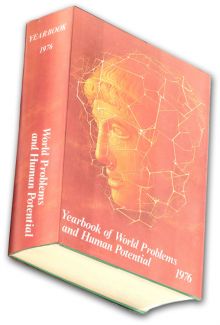
The United Nations Economic and Social Council is one of the six principal organs of the United Nations, responsible for coordinating the economic and social fields of the organization, specifically in regards to the fifteen specialised agencies, the eight functional commissions, and the five regional commissions under its jurisdiction.

The Union of International Associations (UIA) is a non-profit non-governmental research institute and documentation center based in Brussels, Belgium, and operating under United Nations mandate. It was founded in 1907 under the name Central Office of International Associations by Henri La Fontaine, the 1913 Nobel Peace Prize laureate, and Paul Otlet, a founding father of what is now called information science.
World government is the concept of a single political authority with jurisdiction over all of Earth and humanity. It is conceived in a variety of forms, from tyrannical to democratic, which reflects its wide array of proponents and detractors.

Lewis John Collins was an Anglican priest who was active in several radical political movements in the United Kingdom.
Since the late 1990s there have been many calls for reforms of the United Nations (UN). However, there is little clarity or consensus about what reform might mean in practice. Both those who want the UN to play a greater role in world affairs and those who want its role confined to humanitarian work or otherwise reduced use the term "UN reform" to refer to their ideas. The range of opinion extends from those who want to eliminate the UN entirely, to those who want to make it into a full-fledged world government. Secretaries-General have presented numerous ways to implement these new reforms. There have been reform efforts since the creation of the UN and closely associated with each of the Secretaries-General.

The Encyclopedia of World Problems and Human Potential is published by the Union of International Associations (UIA). It is available online since 2000, and was previously available as a CD-ROM and as a three-volume book.
The International Congress Calendar is a calendar of events organized by non-profit international organizations, mainly those organizations which are included in the Yearbook of International Organizations. It has been published since 1960 by the Union of International Associations (UIA) and includes over 425,000 meetings. Over 15,000 new meetings are included every year.
An international non-governmental organization (INGO) is an organization which is independent of government involvement and extends the concept of a non-governmental organization (NGO) to an international scope.

Josué de Castro, born Josué Apolônio de Castro, was a Brazilian physician, expert on nutrition, geographer, writer, public administrator, and activist against world hunger.

The World Academy of Art and Science (WAAS), founded in 1960, is an international non-governmental scientific organization and global network of more than 800 scientists, artists, and scholars in more than 90 countries.
Charles François was a Belgian administrator, editor and scientist in the fields of cybernetics, systems theory and systems science, internationally known for his main work the International Encyclopedia of Systems and Cybernetics.
Henry Charles Usborne was a British Labour Party politician who defected to the Liberal Party.
An international parliament or world parliament or supranational legislature is a theoretical or hypothetical concept that envisions a legislative body with representatives from different countries or sovereign entities, similar to a parliament but at international level for global governance, thus establishing a world government. It's a hybrid system of intergovernmentalism and supranationalism which could be based on a predecessor inter-parliamentary institution or a newly established organization-level legislature.
Intelligence-based design is the purposeful manipulation of the built-environment to effectively engage humans in an essential manner through complex organized information. Intelligence-Based Theory evidences the conterminous relationship between mind and matter, i.e. the direct neurological evaluations of surface, structure, pattern, texture and form. Intelligence-Based Theory maintains that our sense of well-being is established through neuro-engagement with the physical world at the deepest level common to all people i.e. "Innate Intelligence."
A world constitution refers to a proposed framework or document aimed at establishing a system of global governance. It seeks to provide a set of principles, structures, and laws to govern the relationships between nations and address global issues. The concept of a world constitution reflects the aspiration for greater international cooperation, peace, and the resolution of global challenges.

Gaétan Siew is a Mauritian architect.
The FIMCAP, which is short for Fédération Internationale des Mouvements Catholiques d’Action Paroissiale, is an umbrella organization for Catholic youth organizations. Its 31 member organizations are based in 28 countries. The FIMCAP was founded in 1962 and is recognised as an official Catholic organization by the Dicastery for Laity, Family and Life. FIMCAP is also a full member of the European Youth Forum.
Irène de Lipkowski was a French politician who served as a member of the National Assembly from 1951 to 1955, and as the 8th President of the International Alliance of Women from 1973 to 1979.

The Union Internationale des Avocats (UIA) or International Association of Lawyers is an international non-governmental organisation, created in 1927, that brings together more than 2,200 legal professionals from all over the world.
The World Constitutional Convention (WCC), also known as the World Constituent Assembly (WCA) or the First World Constituent Assembly, took place in Interlaken, Switzerland and Wolfach, Germany, 1968. The convention aimed to foster global cooperation and world peace through the development of a World constitution and establishment of a democratic federal world government.








